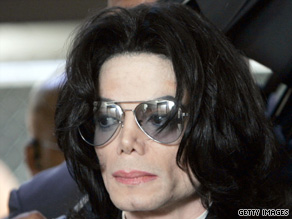
Michael Jackson, the show-stopping singer whose best-selling albums — including "Off the Wall," "Thriller" and "Bad" — and electrifying stage presence made him one of the most popular artists of all time, died Thursday, CNN has confirmed. He was 50.
In 1984, Jackson was burned while singing for a Pepsi-Cola commercial in Los Angeles, when the special effects smoke bomb misfired. He had to have major surgery on his scalp, and said that because of the intense pain he developed an addiction to painkillers. He also was reported to have a form of lupus in the 1980s, but it was later said to have gone into remission. He has had numerous plastic surgeries, including rhinoplasty and a chin implant. In 1993, Jackson’s dermatologist, Dr. Arnold Klein, released a statement saying that Jackson had a rare skin disease called vitiligo. Vitiligo causes a person to lose melanin, the pigment that determines the color of skin, hair and eyes, in patches or all over the body. The condition affects 1 to 2 percent of the population, and no one knows what causes it. Learn about the difference between heart attack and stroke He was also hospitalized with chest pains in 1990 and postponed a concert because of dehydration in August 1993. A concert tour was cut short in November 1993 because of an addiction to prescription painkillers amid allegations of child molestation. During a rehearsal at the Beacon Theater in New York in December 1995, the entertainer collapsed onstage from apparent dehydration and low blood pressure. He was hospitalized in stable condition.
Don’t Miss
Michael Jackson is dead
In depth: Michael Jackson
iReport.com: Share your tribute
Health.com: Why cardiac arrest is deadlier than heart attack
While jurors deliberated in a case in which he was accused of child molestation in June 2005, Jackson went to a hospital for treatment of what his spokeswoman said was recurring back pain. He had complained of back problems before. Rumors circulated in December that Jackson was ill and in need of a lung transplant because of Alpha-1 antitrypsin deficiency, a rare genetic condition. More rumors emerged in May that Jackson had skin cancer. But Randy Phillips, president and CEO of AEG Live, told CNN at the time, “He’s as healthy as he can be — no health problems whatsoever.” Jackson apparently collapsed in his home in Los Angeles on Thursday and was taken by ambulance to UCLA Medical Center. Brian Oxman, Jackson family attorney, told CNN Thursday that Jackson’s use of medications had gotten in the way of doing rehearsals. “His injuries, which he had sustained performing, where he had broken a vertebra and he had broken his leg from a fall on the stage, were getting in the way. I do not know the extent of the medications that he was taking,” he said.
Health Library
MayoClinic.com: Sudden cardiac arrest
Cardiac arrest, distinct from heart attack, affects about 300,000 Americans every year, Dr. Clyde Yancy of the American Heart Association told CNN. Without immediate efforts to resuscitate a person, the survival rate is usually 5 to 15 percent, he said. If resuscitation takes longer than three to five minutes, a person could experience profound impairments, particularly neurologically, he said. Beyond five minutes, the likelihood of success falls quickly, especially in older individuals. Younger people can tolerate cardiac arrest somewhat better, he said.